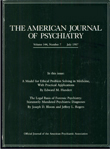Lithium Discontinuation and Subsequent Effectiveness
Abstract
OBJECTIVE: Several reports have raised concern that the discontinuation of lithium may result in treatment resistance following recurrence of affective disorder. This report explores this possibility. METHOD: The data derive from a large, naturalistic follow-up of patients with major depressive disorder or mania. Twenty-eight of the patients in the study were free of lithium and experiencing an episode of mania or schizoaffective mania diagnosed according to Research Diagnostic Criteria when they entered the study, recovered while taking lithium, later experienced a recurrence while not taking lithium, and then resumed lithium treatment. Survival analyses of time to recovery and, subsequently, time to recurrence, used continued lithium treatment as an additional censoring variable. RESULTS: Patients given lithium recovered no more quickly from their index episode than they did from their first prospectively observed episode. Moreover, lithium prophylaxis appeared no less effective after the first prospectively observed episode than after the index episode. CONCLUSIONS: These findings provide no evidence that lithium discontinuation results in treatment resistance when lithium is resumed. (Am J Psychiatry 1998; 155:895–898)



